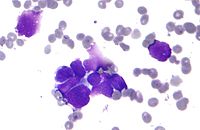
Photo from wikipedia
Background:Ovarian clear cell carcinoma (OCCC) is mostly resistant to standard chemotherapy that results in poor patient survival. To understand the genetic background of these tumours, we performed whole-genome sequencing of… Click to show full abstract
Background:Ovarian clear cell carcinoma (OCCC) is mostly resistant to standard chemotherapy that results in poor patient survival. To understand the genetic background of these tumours, we performed whole-genome sequencing of OCCC tumours.Methods:Tumour tissue samples and matched blood samples were obtained from 55 Japanese women diagnosed with OCCC. Whole-genome sequencing was performed using the Illumina HiSeq platform according to standard protocols.Results:Alterations to the switch/sucrose non-fermentable (SWI/SNF) subunit, the phosphatidylinositol-3-kinase (PI3K)/Akt signalling pathway, and the receptor tyrosine kinase (RTK)/Ras signalling pathway were found in 51%, 42%, and 29% of OCCC tumours, respectively. The 3-year overall survival (OS) rate for patients with an activated PI3K/Akt signalling pathway was significantly higher than that for those with inactive pathway (91 vs 40%, hazard ratio 0.24 (95% confidence interval (CI) 0.10–0.56), P=0.0010). Similarly, the OS was significantly higher in patients with the activated RTK/Ras signalling pathway than in those with the inactive pathway (91 vs 53%, hazard ratio 0.35 (95% CI 0.13–0.94), P=0.0373). Multivariable analysis revealed that activation of the PI3K/Akt and RTK/Ras signalling pathways was an independent prognostic factor for patients with OCCC.Conclusions:The PI3K/Akt and RTK/Ras signalling pathways may be potential prognostic biomarkers for OCCC patients. Furthermore, our whole-genome sequencing data highlight important pathways for molecular and biological characterisations and potential therapeutic targeting in OCCC.
Journal Title: British Journal of Cancer
Year Published: 2017
Link to full text (if available)
Share on Social Media: Sign Up to like & get
recommendations!